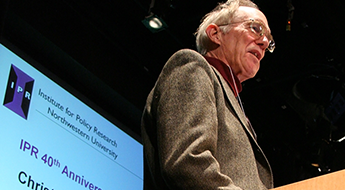Training Program Improves Police Officers’ Interactions with the Public
Rob Voigt analyzes body camera footage to understand how police speak to drivers during traffic stops
Get all our news
Body cameras are largely paid for by public dollars but the footage they produce is almost entirely inaccessible to the public or in the service of the public good.”
Rob Voigt
IPR computational linguist

Interactions between police officers and the public have been under heightened scrutiny in recent years as videos of the killings of Black Americans have led to mass protests and calls for reform. To increase transparency around these exchanges, police agencies have ramped up their use of body cameras over the last decade.
New research by IPR computational linguist Rob Voigt and his colleagues analyzing body-worn camera footage shows that after going through a procedural justice program, police officers spoke more respectfully to drivers they pulled over for traffic stops. The study, published in PNAS Nexus, not only reveals how effective the training was, but also how camera footage can be used to capture and change the way police interact with the public.
“Our previous work showed racial disparities in officer communication,” Voigt said. “The implementation of this training provided an opportunity to examine whether those disparities—or indeed officer communication at all—could be improved by training.”
The researchers examined a procedural justice training program for police officers in the Oakland Police Department (OPD) in California. The program was built based on the researchers’ 2017 study, which found that OPD officers spoke more respectfully to White drivers than to Black drivers during traffic stops. In response, the OPD redeveloped their training, adding a section about officer communication with support from Voigt and his co-authors.
During the training, officers were encouraged to speak respectfully by greeting drivers, stating the reason for the stop early on, expressing concern for the drivers’ safety, using reassuring language, and addressing drivers with formal titles. Using computational linguistics techniques, the researchers examined transcripts of camera footage from traffic stops made by 122 OPD officers 4 weeks before and after the procedural training. They wanted to see if officers’ communication changed and for which drivers.
“Officers employed more of the key strategies for respectful communication outlined in the training,” Voigt said. “Officers were more likely to express concern for drivers’ safety, offer reassurance, and provide explicit reasons for the stop than in pre-training stops.”
Because only 15% of the traffic stops involved White drivers, the researchers couldn’t conclude whether the training changed the way officers spoke to drivers of different racial groups. After the training, officers were more respectful to everyone, including Black drivers. However, officers did address Black drivers differently than White ones.
“The training suggested that officers should use more formal titles, like ‘sir’ or ‘ma’am,’ and fewer informal titles like ‘bro’ or ‘dude,’” Voigt said. “We find that post-training officers, in fact, used fewer formal titles and more informal titles with Black drivers than before the training.”
In post-training feedback, some officers explained they used informal titles with Black drivers to try to build rapport. More research is needed to understand whether Black drivers interpret officers’ use of informal titles as friendly, or as condescending and putting further strain on the relationship between police and Black Americans. Another important issue to study is whether behavior changes from this kind of training will last.
While body camera footage isn’t commonly used at a large scale to study behavior, Voigt says there are real benefits to making videos of police officers’ interactions available to researchers.
“Body cameras are largely paid for by public dollars but the footage they produce is almost entirely inaccessible to the public or in the service of the public good,” he said. “This could be addressed with policy changes in departments and legislation.”
Rob Voigt is assistant professor of linguistics and an IPR fellow.
Photo credit: iStock
Published: November 21, 2024.


